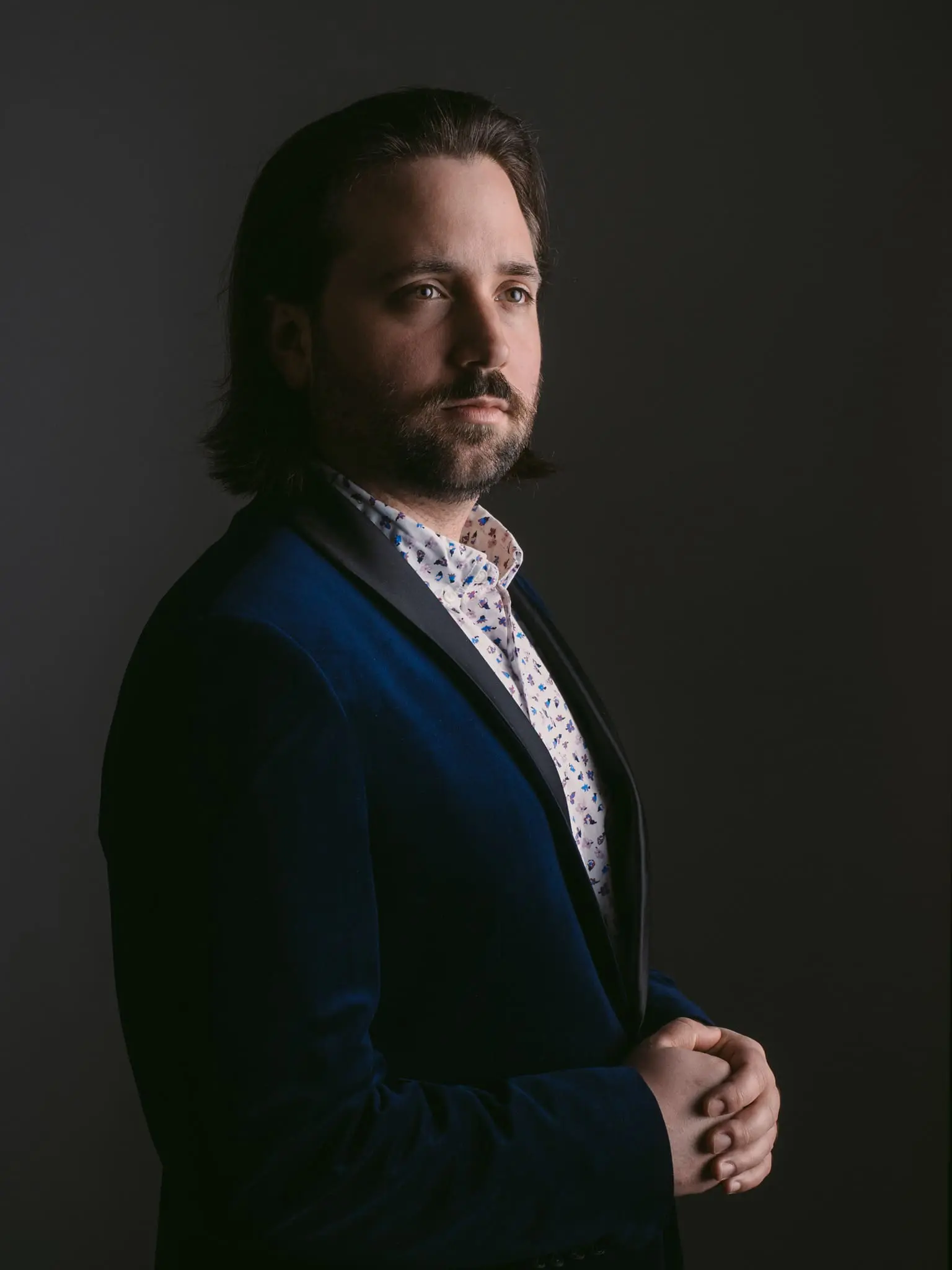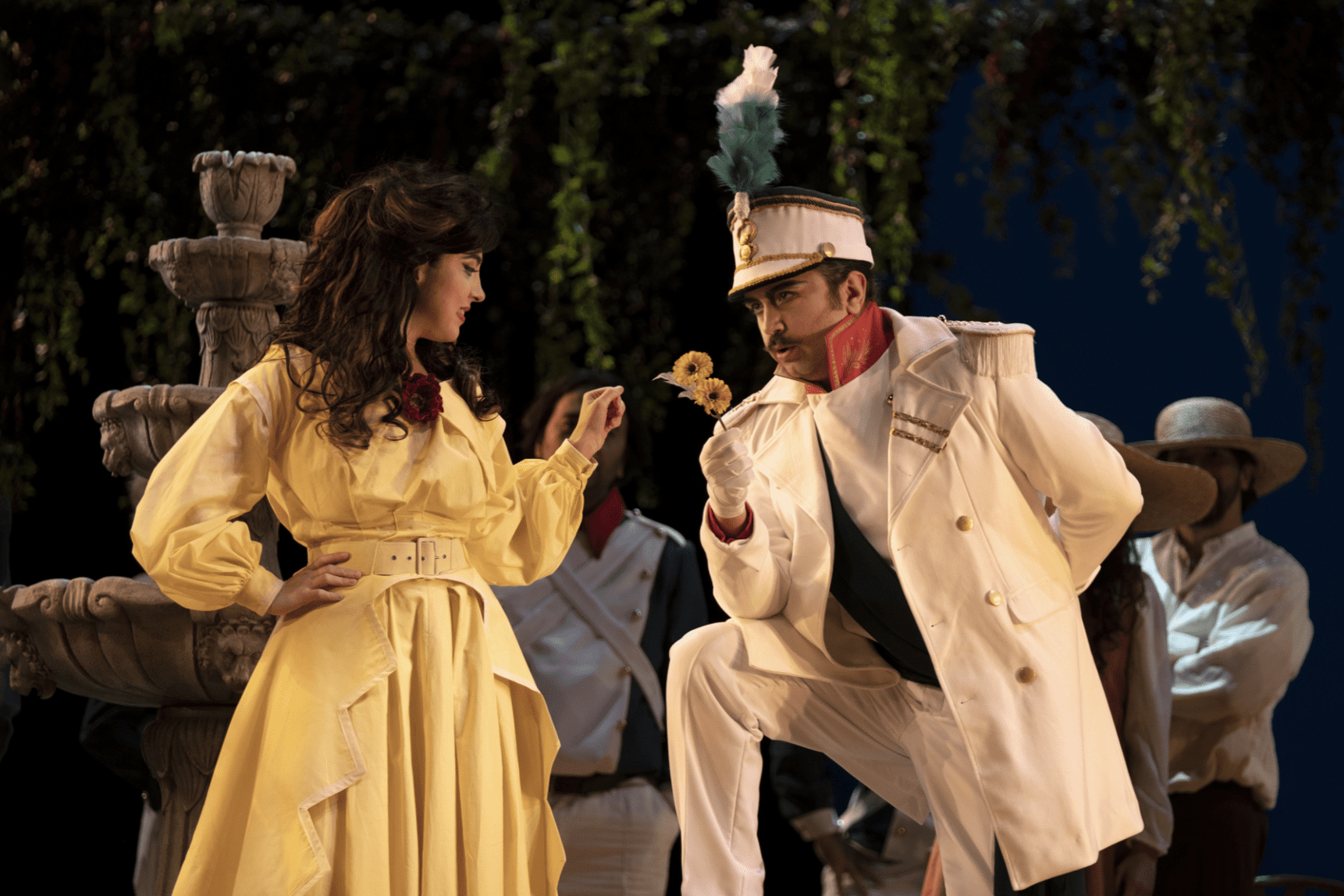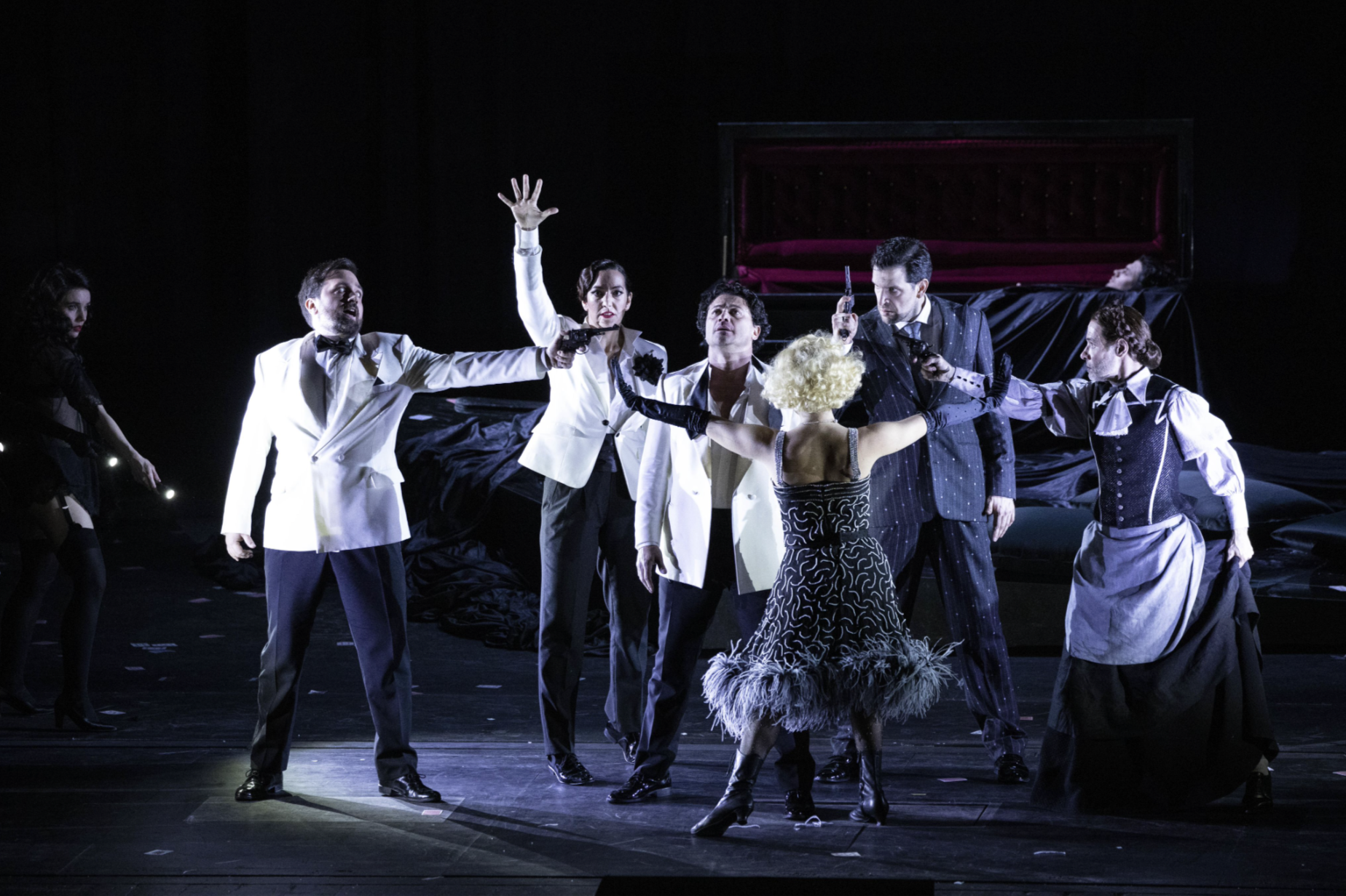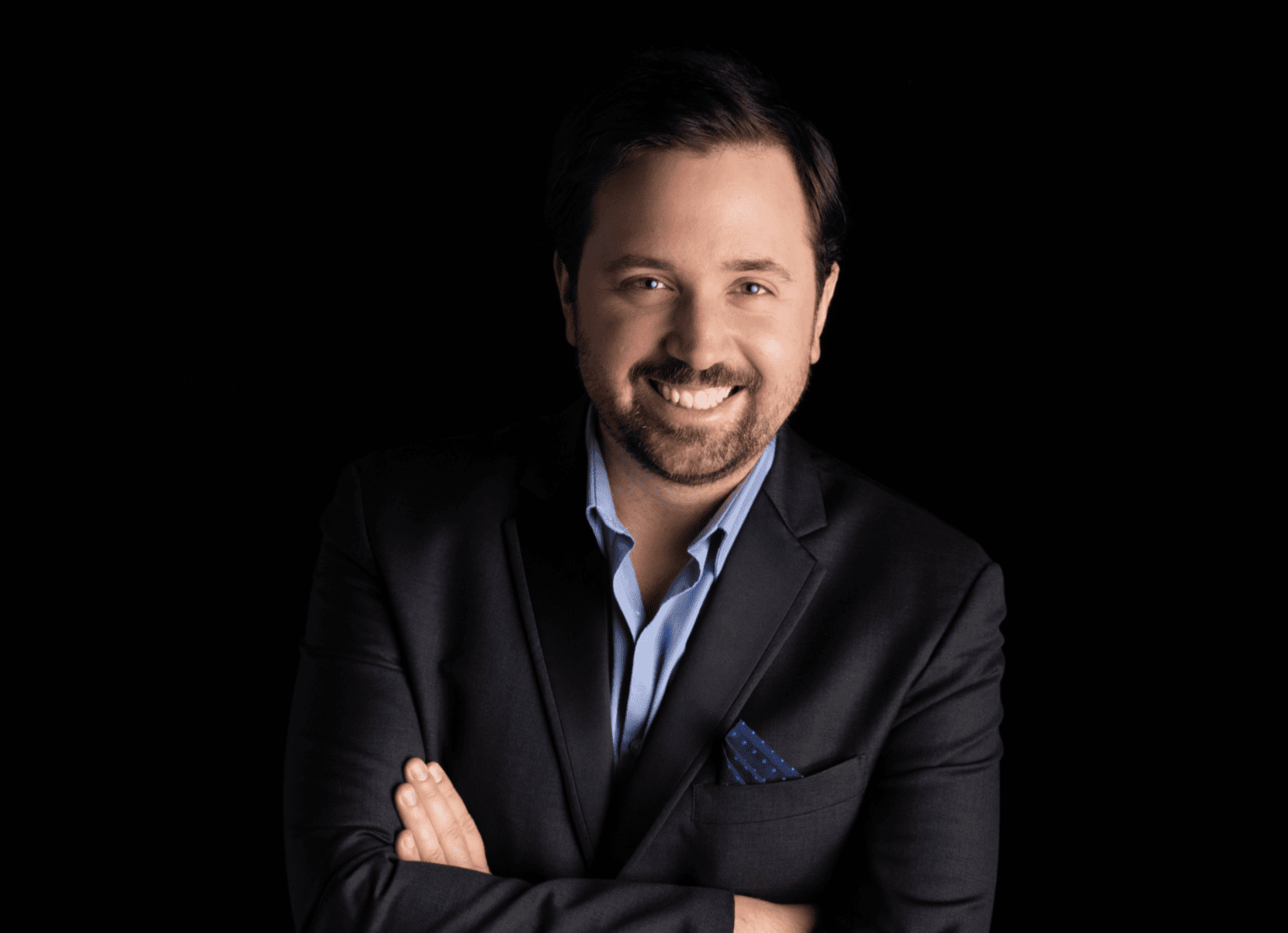French-Canadian baritone Hugo Laporte is in Montreal, preparing to reprise the role of Conte d’Almaviva in Opéra de Montréal‘s production of Mozart’s The Marriage of Figaro, opening Sept 23 (tickets here). He performs alongside Croatian baritone Leon Košavić (Figaro), and a cast of stellar Canadian voices including sopranos Kirsten MacKinnon (Countess Almaviva) and Andrea Núnez (Susanna), mezzo-soprano Katie Fernandez (Cherubino), bass-baritone Scott Brooks (Bartolo) and soprano Emma Fekete (Barbarina).
Upcoming highlights for Laporte include singing Henri Ashton in Opéra de Québec‘s production of Donizetti’s Lucie de Lammermoor from Oct 21-28, and Escamillo in Orchestre Philharmonique de Coeur des Mélomanes‘s production of Bizet’s Carmen: In Concert on Feb 24 and 25, 2024 with fellow Canadians mezzo-soprano Wallis Giunta (Carmen), tenor Adrian Kramer (Don José), and soprano Myriam LeBlanc (Micaëla).
We caught up with him to reflect on early career beginnings, favourite composers, how he defines success, and all things opera life. To Laporte, success is about “cultivating inner peace… and even better, sharing that happiness with others!”
What inspired you to sing?
This is a really tough question. My passion for singing grew over the years. I have been performing music for 25 years now, but only discovered singing a decade into my musical journey. I tried a few instruments along the way, but at the age of 16 I had to choose a field to eventually pursue a career.
Music was my passion, but I was not passionate about any instrument yet. That’s when my childhood music teacher suggested that I try singing lessons – I liked it enough that I applied for the music (voice) program at a local CEGEP. I liked it enough, but it still took years to really develop a passion. I was fortunate enough to get a lot of support from my family, friends, teachers and local organizations. I kept singing because I liked it a lot, and I guess it also helped that I progressed at a good pace. The more I sang, the more audiences and artists I met, and the more works I discovered. I became more inspired. What definitely made me commit to it full-time was the success that I started to gather in competitions in 2014.
Favourite place?
Home. I’m OK with travel, but I prefer being at home with my wife and two kids. There is no better place in the world. We are fortunate enough to live in a beautiful neighborhood in the Quebec region, where most of our extended family also live.
If you weren’t a singer, you’d be…
I also studied Musicology for two and a half years. If a singing career opportunity hadn’t presented itself, I might have pursued this field. I also had (and still have, to some extent) an interest in sound engineering. I’ve also always liked computer engineering and computer science. Still do!
Top 3 favourite composers
Beethoven, Tchaikovsky, J.S. Bach, and I could list some more that I like equally!
Which opera role do you want to be singing right now?
Count Almaviva in Le nozze di Figaro, of course! It’s the opera I’m singing at Opéra de Montréal, and there’s nothing else I’d rather be singing at the moment. The cast, stage director, and conductor are all amazing artists and people. It is so much fun! Stephen Lawless’s staging is so thrilling and precise, and Nicolas Ellis’s musical direction compelling and fresh. I’ve heard tickets are selling very well, so it’s going to be even more exciting with full houses!
Who is a singer you admire that is currently working?
There are many. But one that I have admired for a long time is baritone Ludovic Tézier. Huge career, incredible instrument, excellent technique, intelligent musicality and powerful acting.
What’s something most people don’t know about opera life?
I think most people don’t realize how much time we spend studying the music. Surprisingly, while singing is arguably the most important skill, actual singing is quite a small part of being an opera singer. (This, of course, depends on the type of career and what stage of the career the singer is at.)
Most of my day-to-day work is actually studying the roles: learning and analyzing the music, comparing different editions, reading the libretto, reading translations from different sources, working on pronunciation with phonetics and/or coaches, listening to different recordings, watching different stagings, memorizing, etc. Singing eventually comes into play, but it is pretty much one of the last steps.
This is why it is important to maintain a healthy technique. Each role has their own vocal challenges and we don’t really have time to prepare for them individually. We have to prepare and maintain our instrument so it is able to perform at its highest at all times.
Tent or hotel?
For leisure, I’m more of a tent guy. I was in the Scouts all my childhood and even volunteered a few years as a Scouter. But when working, comfort is essential.
That said, since I have started my career I haven’t really taken enough time off to go out camping and with young kids, it’s a bit more complicated. I hope I’ll be able to go out camping again sometime soon!
Coffee or tea?
While I enjoy both beverages regularly (I love drinking iced tea during the summer!), I will say coffee since I am a home barista! I do enjoy pour-over and espresso made from freshly ground fairtrade coffee from a local roaster. My favourite espresso drink is an Oat milk cortado made with a medium roast blend!
What’s your favourite mind-calming practice?
Meditation helped me tremendously. I started practicing it after high school, and have been using it regularly for years now accompanied by reading books on the subject (meditation, happiness and Buddhism). Meditation has had a lasting impact on my general happiness and emotional management.
What’s the downside of being an opera artist?
There are a few. For me, travel is a downside due to being away from family and its impact on the environment. Air travel is extremely polluting. While I am still actively looking for opportunities in Canada and abroad, I see these aspects of travel as a downside for sure.
Stress is another downside. While I enjoy the feeling of excitement when performing on stage, stress can be a challenge and sometimes it can feel overwhelming. I know I am not alone in this situation and a lot performing artists feel the same way.
Lastly, financial instability. It is not an easy “business” to be in, and even when things go well, it can be a challenge to plan everything well. Opera artists have a lot of expenses, and we only get paid once the work is done. Opera is not a lucrative business, and many classical music organizations around the world are having major financial concerns.
What’s the best thing about being an opera artist?
I get to enjoy my passion every day! Studying music, listening to music, reading about music, making music, sharing it with an audience, and talking about it to friends and colleagues daily. Even teaching it! The standards to perform this form of art professionally are very high, so it is rigorous work but also very rewarding.
Are you happiest in the country or in the city?
Country. I think we found a good middle ground – my family lives in the suburbs, in an older neighborhood that has lots of trees and space. It is very quiet and the surroundings are beautiful!
Do you enjoy cooking? What is your best dish?
I do enjoy cooking, and I cook almost exclusively vegan. I don’t usually follow recipes, instead I try to use seasonal vegetables and create something with that. Some dishes I like: tomato tart with homemade crust, stuffed bell peppers, and sauteed vegetables with crispy tofu.
What is something most people don’t know about you?
I really like computer science and computer engineering. As a teenager, I was learning and writing a bit of HTML and CSS, learning about web hosting, building and fixing computers, and learning basic computer engineering.
More recently, during the pandemic, I watched a lot a free courses on general computer science, programming, security, networking, etc. I even built myself a home lab for learning purposes. I also worked for over a year as a help-desk/IT technician during the pandemic while continuing my singing lessons, and my regular voice exercises.
What does success look like to you?
Happiness. By that, I don’t mean unending joy as life can be really hard sometimes. But I think achieving and cultivating an inner peace is sort of the end goal in life. Even better, sharing that happiness with others!
LEARN MORE ABOUT HUGO LAPORTE
VISIT HIS WEBSITE

Ⓒ Catherine Charron-Drolet

Catherine Saint-Arnaud (Adina) and Hugo Laporte (Belcore) in Opéra de Québec’s production of Donizetti’s L’Elisir d’amore, 2021 Ⓒ Louise Leblanc

The ensemble cast in Teatro alla Scala’s production of Offenbach’s Les Contes d’Hoffmann Ⓒ Teatro alla Scala
Mozart’s The Marriage of Figaro
Opéra de Montréal
Sept 23 – Oct 1, 2023

STAGE DIRECTOR Stephen Lawless
CONDUCTOR Nicolas Ellis
SETS & COSTUMES Leslie Travers
LIGHTING Thomas C. Hase
CHOREOGRAPHY Eric Sean Fogel
COUNT ALMAVIVA Hugo Laporte
FIGARO Leon Košavić
COUNTESS ALMAVIVA Kirsten Mackinnon
SUSANNA Andrea Núnez
CHERUBINO Katie Fernandez
BARTOLO Scott Brooks
BARBARINA Emma Fekete
Orchestre Métropolitain
Choeur de l’Opéra de Montréal
Can true love shake up the social order and help fight social inequalities? The Marriage of Figaro, a landmark work by the great Mozart, is a comic opera that is intended as a critique of the French bourgeoisie of the time – a class seriously weakened and on the verge of collapsing. This is the very first time that rising star Nicolas Ellis will be conducting at the Opéra de Montréal.
We find ourselves in Seville, in the South of Spain. Figaro and Susanna, valet and chambermaid of the Count and Countess Almaviva, are in love and are about to join their destinies together. But their marriage preparations are threatened by a number of traps and obstacles set up by a devious Count Almaviva, who is infatuated with the bride-to-be. Will the union of Figaro and Susanna prevail?
Opera Canada depends on the generous contributions of its supporters to bring readers outstanding, in-depth coverage of opera in Canada and beyond.
Please consider subscribing or donating today.














